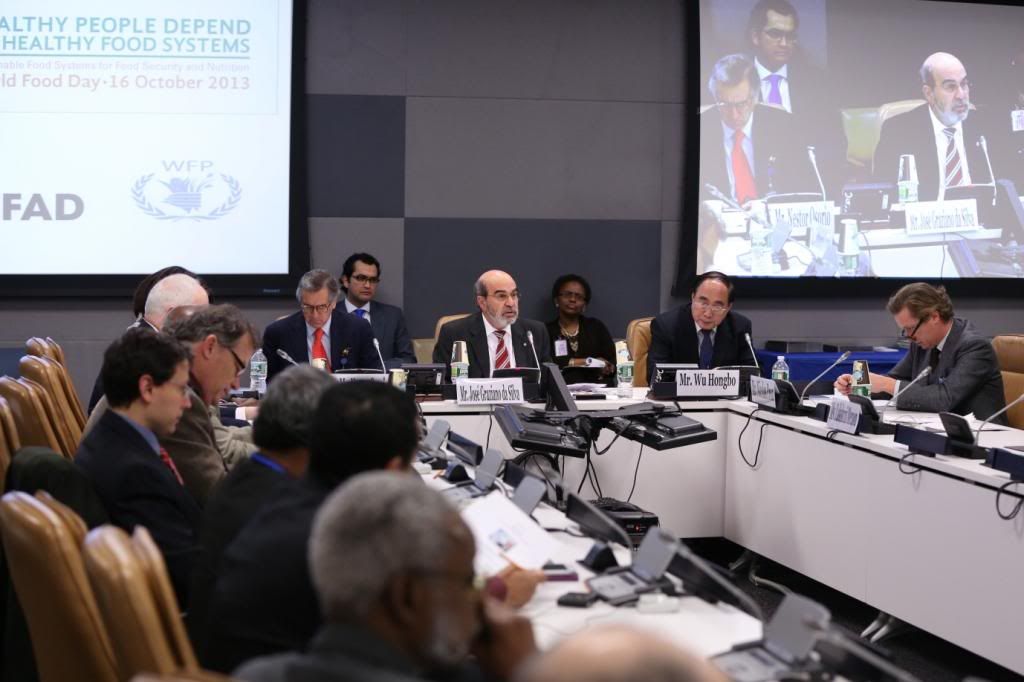World Food Day 2013, New York Ceremony
23/11/2013

Ladies and Gentlemen,
It is an honour to be here with you at the observance of the 33rd World Food Day by the United Nations General Assembly.
As you know, World Food Day takes place each year on 16 October, the anniversary of the founding of FAO in 1945, and it is followed by this celebration in New York.
This year’s World Food Day theme is Sustainable Food Systems for Food Security and Nutrition.
World Food Day this year emphasized a critical relationship. Namely, we cannot improve nutrition without food security. And we cannot achieve food security without sustainable food systems.
Are we there?
If we answer this question from a supply perspective only, we might say yes.
Food production has tripled since World War Two and per capita availability has increased by over 40%.
However, from the demand perspective, we can see that over half of the world’s population is affected by either under- or over-consumption.
In other words, they either do not eat enough, or they eat too much. And even then, many times, they do not eat the nourishing food they need.
And they remain trapped in hunger mainly because they lack the means to produce or buy the food they need. It is scandalous that this happens in a world where there is enough food for all.
Ending malnutrition, and ending hunger, is not only an issue of human dignity. It is also about ensuring that everyone has the right to healthy food.
The flip side is the huge economic benefits that could result from ending hunger and malnutrition.
The economic costs of hunger can amount to as much as 5 percent of global income through lost productivity and direct health care costs.
Improving our food systems also means improving their sustainability.
The increase in food production, which the intensive use of inputs and the Green Revolution made possible, came at a high environmental cost. Meanwhile about one-third of the food produced is lost or wasted.
This is not sustainable today; nor will be it so in 2050, when we will have to provide food for a population of more than 9 billion people.
So it is clear that we have many issues to tackle to make our food systems sustainable. But, for the first time in history, we have the means we need to overcome them, and we are seeing clear signs that we can do so.
According to our latest figures, 62 out of 128 developing countries monitored by FAO have already reached the Millennium Development Goal hunger target, that is, reduced by half the proportion of undernourished people between 1990 and 2015.
I believe that with one final push many more can join them.
Ladies and gentlemen,
I see many challenges ahead of us, but also progress and successful experiences that we can build on through a strong, multi-sector approach. These successes need to inspire us.
We need to work together in this final push to reach the MDGs. And we need to use this momentum to aim for an even bolder goal: a food secure and sustainable world, as set out by UN Secretary-General Ban Ki-moon in the Zero Hunger Challenge.
In the framework of the post-2015 Development Agenda, FAO stands together with UN partners, governments, civil society and other stakeholders in supporting the proposals agreed on at the high-level consultation on hunger, food security and malnutrition, that took place in Madrid, in April.
We have before us a unique and historic opportunity to achieve a world that is free from want. That means ensuring our basic human rights, starting with the right to food.
It is the very same vision that inspired the creation of FAO 68 years ago: Fiat Panis, as FAO’s motto reads.
Today, this vision is translated into the five strategic objectives that now guide FAO’s work: ending hunger and malnutrition, promoting sustainability, reducing rural poverty, making food systems more inclusive and efficient and building resilience.
By encouraging healthy, sustainable food systems, we can all play a part in creating a world where Zero Hunger is no longer a bold objective, but a day-to-day reality.
Thank you for your attention.
